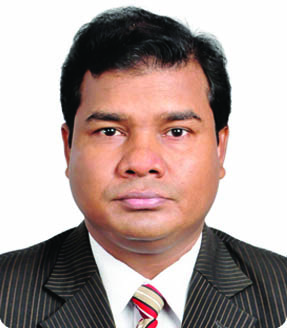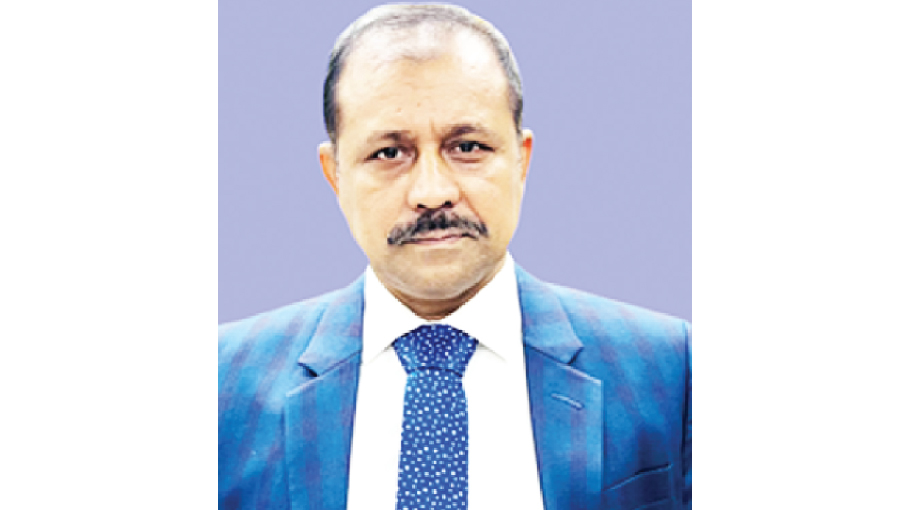Govt subsidises agricultural mechanisation to enhance farm production
AMPTIM PD Tarik Mahmudul Islam tells Bangladesh Post

The government of Bangladesh is trying to patronise local machinery manufacturers aiming to boost farm production and developing self-reliance, said Tarik Mahmudul Islam Project Director, Agriculture Mechanization Project Through Integrated Management, Department of Agricultural Extension (DAE) in an interview with daily Bangladesh Post.
“If the farmers are made efficient through the necessary training, agricultural mechanization will be more productive for us”, Mahmud said adding that Mechanisation raises the efficiency of labourers and enhances the farm production per worker.
It results in a shift from subsistence farming to commercial agriculture. Agricultural mechanization programme has been accelerated in Bangladesh in the recent years.
Tarik Mahmudul Islam is a senior Agronomist. He completed his Secondary School Certificate in 1986 from Shibpur Pilot High School, Higher Secondary Certificate in 1988 from Shibpur Shaheed Asad Collage and graduated from Bangladesh Agricultural University (BAU), Mymensing. Then he obtained M.Sc.Ag from the department of Agronomy in the same university.
In his long career, Tarik Mahmudul Islam worked in various capacities in different departments which includes former Deputy Director in Feni, ex-UAO in Borura Cumilla and UAO in Shitakundu, Chittagong.
Currently he has been working as a Project Director, Agriculture Mechanization Project Through Integrated Management, Department of Agricultural Extension (DAE).
Tarik Mahmudul Islam shared his thoughts on the Agricultural sector of Bangladesh. Here is the magnetic parts of that interview for our readers.
Bangladesh Post: Please tell us what is the contribution of Bangabandhu in the field of agricultural mechanization?
Tarik Mahmudul Islam: If we want to know about the contribution then we have to look back at the beginning of agricultural mechanisation. At that time tractors, engine-driven pumps and spares were distributed among farmers. Huge numbers of cattle heads were died in coastal area due to devastating cyclone of 1970. In this perspective, limited number of tractors and power tillers were distributed among the farmers affected areas for cultivation. Under the directives of Father of the Nation Bangabandhu Sheikh Mujibur Rahman 40,000 power-driven pumps, 2900 deep tube wells and 3000 shallow tube wells were distributed with subsidy in 1973 for the first time for increasing production in the newly-independent country. It was the historical step for expansion of modern agricultural machineries. Our prime minister and daughter of Bangabandhu, Sheikh Hasina has been trying to bring the whole country under agricultural mechanisation following the path of her father. Our agriculture is getting a modern shape due various initiatives taken by our agriculture friendly prime minister and agriculture minister.
Bangladesh Post: We know that the current government is working relentlessly for agricultural mechanization and this project is a challenge of the current government. Tell us about the activities in the 2021-2022 financial years?
Tarik Mahmudul Islam: You are correct. Agricultural mechanization is a major challenge in the present context. On the instructions of the Prime Minister, all those involved in the project including the Honorable Minister of Agriculture are working hard for mechanization of agriculture. As a result, today we have progressed far in agricultural mechanization. This project is playing a special role for the diversification of agriculture. Mechanization will lead to a revolution in agriculture. Now to your main point. We are able to get the right machine the right farmer. A . A total of 17275 agricultural equipments including 6015 combine harvesters, 1232 reapers, 125 rice transplanters have been distributed to farmers across the country through 50-70% subsidy depending on region.
Bangladesh Post: What are the main goals of the project?
Tarik Mahmudul Islam: The goal of the project is to boost the crop production by making agriculture more profitable and commercially sustainable. The other goal is to create new jobs for farmers.
Bangladesh Post: Would you please tell us something about the project?
Tarik Mahmudul Islam: Department of Agricultural Extension (DAE) has taken the project in order to promote farm machanisation as the farmers suffer from huge shortages of farm labourers during the harvesting seasons. The project will be implemented in all the upazilas under 64 districts of the country. It will cost Tk 3020 crore to implement the project. The project has started in July 2020 and will be implemented by June 2025. The project focuses on activities related to expansion of modern agricultural technology, production of high value crops, increasing productivity through the use of agricultural machinery and increasing the real income of peasant families.
Bangladesh Post: Now please brief us about the objectives of the project?
Tarik Mahmudul Islam: The ultimate objective of the project is to Reduce 10 to 15 per cent wastage of crops, save 50% time and 20% money in cultivation by supplying and using more modern agricultural machineries; raise 50 pc working capacity of agricultural machineries by synchronizing cultivation of crops; reduce agriculture production cost and increase productivity of crops; enhance women participation in post-harvest management through mechanisation; and reduce poverty through boosting production of crops.
Bangladesh Post: What are the benefits the farmers will get after mechanization of agriculture?
Tarik Mahmudul Islam: Agriculture is one of our national occupations which has occupied a great portion internationally. Now come to your question. I have already given answer partially of this question earlier. Again I say, our Father of the Nation Bangabandhu Sheikh Mujibur Rahman dreamt for mechanization of agriculture. Our Prime Minister Sheikh Hasina has been trying to export agricultural products through machanisation of agriculture. It is not possible to export agri products without mechanisation. If it become possible from our part to mechanise agriculture fully, within a short time Bangladeshs' agriculture will be rich with modern machineries. We are facing some problems while working. Our farmers are habituated with traditional system. By providing training we are making them time-befitting. The important thing is that many youths are engaging themselves with farming. It needs short time to adapt the youths because they have modern knowledge. We hope, once our agriculture will be mechanised.
Bangladesh Post: Tell us about agricultural mechanization at present status and future plan?
Tarik Mahmudul Islam: From 2010 to 2016 government arranges subsidy program in mechanization. In this period, 25-30% of subsidy was provided in machine cost. When he/she purchases a machine in local market, farmers pay the cost to the purchase retailer and destruct subsidy amount. From 2016 to till now government has been increased subsidy by 70% for coastal and hoare areas and by 50% subsidy for plan lands. Efficient mechanics are needed for operation and maintenance of modern supplied machine. On the other hand, available spare parts are also needed in local market. Agricultural mechanization in Bangladesh is increasing day by day due to the smart different initiatives of the current government.
At present 70% of spare parts of power tiller and irrigation machinery are produced domestically. It is very positive for us. The quality of local spare parts has some variation with international standards. The agricultural machinery manufacturers of Bangladesh appealed to the honorable agriculture minister that manufacturing of spare parts of modern machinery requires highly priced automated capital machinery i.e CNC, auto cutter, heat treatment machine etc. If creating common facility centers at agricultural machinery spare parts manufacturing zone, where all automated the capital machinery will be installed by government then authority would serve facility for manufacturer to make quality parts manufacturing of machine. That will reduce investment and production cost of agricultural machinery parts i,e with government support, indigenous manufacturers are able to produce world-class machines and machine parts in our country.



